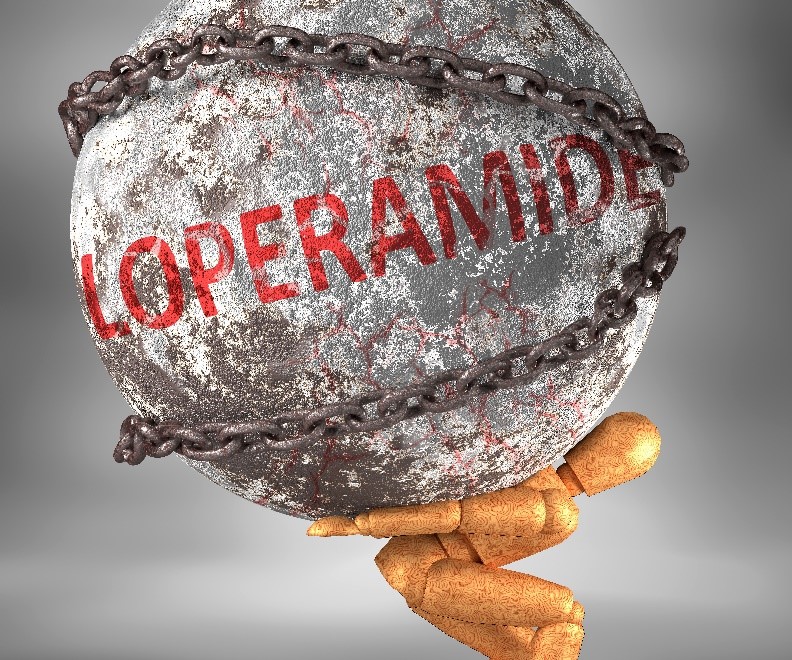 Loperamide, commonly known by its brand name Imodium, is a widely used over-the-counter medication designed to treat acute diarrhea and chronic diarrhea. While it is generally safe when taken as directed, there is a growing concern about its misuse and abuse. The Consumer Healthcare Products Association (CHPA) has launched a loperamide safety education campaign to raise awareness among healthcare professionals about the potential dangers of loperamide abuse, which can lead to severe, even fatal, serious cardiac adverse events when taken in high doses of loperamide. This article aims to shed light on loperamide abuse and addiction, including its side effects, the risks of loperamide overdose, and the importance of seeking professional help for those struggling with dependency.
Loperamide, commonly known by its brand name Imodium, is a widely used over-the-counter medication designed to treat acute diarrhea and chronic diarrhea. While it is generally safe when taken as directed, there is a growing concern about its misuse and abuse. The Consumer Healthcare Products Association (CHPA) has launched a loperamide safety education campaign to raise awareness among healthcare professionals about the potential dangers of loperamide abuse, which can lead to severe, even fatal, serious cardiac adverse events when taken in high doses of loperamide. This article aims to shed light on loperamide abuse and addiction, including its side effects, the risks of loperamide overdose, and the importance of seeking professional help for those struggling with dependency.
Understanding the Side Effects of Loperamide
Loperamide is a peripherally acting mu-opioid agonist that works by slowing down gut movement. However, when misused, it can have serious side effects. At therapeutic doses, loperamide is generally safe, but at very high doses, it can cross the blood-brain barrier and produce opioid-like effects, which is a significant concern for potential drug abuse and loperamide overdose.
Here are some of the most significant side effects associated with loperamide abuse:
- Cardiac Issues: High doses can inhibit potassium channels and cardiac sodium channels, leading to QT interval prolongation, QRS complex widening, and potentially fatal arrhythmias such as Torsades de Pointes and cardiac arrest. Other cardiac symptoms include unresponsiveness, syncope (fainting), and a rapid or irregular heartbeat. Reports from the FDA drug safety communication highlight these serious cardiac adverse events.
- Gastrointestinal Complications: Severe nausea, vomiting, constipation, and even paralytic ileus can occur. The national poison data system has documented numerous cases of loperamide toxicity.
- Substance Abuse History: Individuals who abuse loperamide often have a history of substance use disorder or opioid withdrawal symptoms.
Recognizing these symptoms early is crucial for preventing serious health outcomes. It’s important to note that loperamide abuse can occur in any age group or gender, highlighting the need for widespread awareness and monitoring.
Can Loperamide Abuse Lead to Addiction?
Loperamide, while primarily intended for short-term use in treating diarrhea, has increasingly become a substance of abuse due to its opioid-like properties at high doses. Addiction can develop when individuals start taking loperamide in large quantities over extended periods. Some individuals might misuse loperamide for chronic diarrhea, which can lead to significant health risks, including overdose and severe adverse effects.
Here are some key points to understand loperamide addiction:
- Psychological Aspects: Users may experience cravings, anxiety, and obsessive thoughts about obtaining and using the drug. Mental illness and poor man’s methadone are often linked to such drug abuse.
- Physical Withdrawal Symptoms: Severe symptoms can mirror those of other opioids, including muscle aches, diarrhea, insomnia, and agitation.
- Tolerance Development: The body builds a tolerance to the drug, requiring higher doses to achieve the same effects, leading to dependency and addiction.
- Dosing Instructions: It is crucial to follow the recommended dosing instructions for loperamide. If a missed dose occurs, it should be taken as soon as remembered unless it is almost time for the next dose. Taking too much can lead to overdose and serious health complications.
Despite its over-the-counter status, loperamide should not be underestimated in its potential for addiction and harm. Patients who have struggled with opioid use disorder are particularly vulnerable, and their history of substance abuse should prompt careful monitoring and intervention by healthcare providers. Professional treatment is essential for those struggling with loperamide addiction, involving comprehensive programs that address both physical and psychological aspects of addiction.
Managing Loperamide Withdrawal: A Comprehensive Guide for Opioid Withdrawal
 Managing withdrawal from loperamide can be challenging, but understanding the symptoms and having a structured plan in place can make it more manageable. Withdrawal symptoms can be similar to those experienced with other opioids.
Managing withdrawal from loperamide can be challenging, but understanding the symptoms and having a structured plan in place can make it more manageable. Withdrawal symptoms can be similar to those experienced with other opioids.
Here are the typical symptoms of loperamide withdrawal:
Physical Symptoms:
- Gastrointestinal distress: Diarrhea, nausea, vomiting, and abdominal cramps are common.
- Muscle pain: Muscle aches and cramps can occur as the body adjusts to the absence of the drug.
- Sleep disturbances: Insomnia and restlessness are typical during withdrawal.
- Flu-like symptoms: Sweating, chills, and fatigue often accompany the detox process.
- Loperamide interacts with opioid receptors, contributing to withdrawal symptoms similar to those of other opioids.
Psychological Symptoms:
- Anxiety: Increased levels of anxiety and nervousness are common.
- Depression: Feelings of sadness and hopelessness can occur as the brain adjusts to the lack of opioid stimulation.
- Cravings: Strong urges to take loperamide can persist during withdrawal.
Effective detox strategies include medical supervision, proper hydration and nutrition, medications to manage symptoms, support systems, and in some cases, gradual tapering of the drug. These strategies help alleviate withdrawal symptoms and ensure a safer detox process. Comprehensive treatment programs, like those offered at United Recovery Project, provide a structured environment for detox and recovery.
Loperamide and Famotidine Abuse: What You Need to Know
Combining loperamide with alcohol can have serious and potentially dangerous consequences. Both substances affect the central nervous system, and their interaction can amplify their effects, leading to increased risks and health complications.
Here are the key dangers of mixing loperamide and alcohol:
- Increased Risk of Overdose: High doses of loperamide can cause severe cardiac issues, including arrhythmias and cardiac arrest. Alcohol can exacerbate these effects, significantly increasing the risk of overdose. Additionally, loperamide cardiotoxicity can lead to severe cardiac issues.
- Enhanced Sedative Effects: Both substances have sedative properties. When combined, they can intensify sedation, leading to extreme drowsiness, impaired motor skills, and decreased cognitive function.
- Gastrointestinal Complications: Loperamide can cause gastrointestinal issues such as constipation and abdominal pain, especially at high doses. Alcohol can irritate the stomach lining and lead to gastritis, exacerbating these problems.
- Dehydration: Alcohol is a diuretic, leading to dehydration. Loperamide misuse can also cause dehydration due to its effects on the gastrointestinal system, increasing the risk of severe dehydration.
- Mental Health Risks: Both substances can impact mental health. Alcohol exacerbates anxiety and depression, while loperamide abuse can lead to psychological dependence.
- Loperamide and Famotidine Abuse: The abuse of loperamide and famotidine can trigger ventricular tachycardia, posing significant cardiac risks.
The safest approach is to avoid mixing loperamide with alcohol entirely. Educating patients about the risks and monitoring for signs of misuse can help prevent these dangerous interactions. Seeking professional help is crucial for individuals struggling with the misuse of loperamide and alcohol.
Getting Help at United Recovery Project for Serious Cardiac Events
 If you or a loved one is struggling with loperamide addiction, seeking professional help is crucial. The increasing trend of abusing loperamide highlights the importance of professional intervention to prevent further health complications. United Recovery Project offers intensive and unique programs for patients dealing with loperamide addiction. They provide various luxury treatment services, including drug detox, partial hospitalization programs, intensive outpatient programs, and sober living and alumni programs. Throughout your stay, you will be monitored by a team of specialists to ensure a comfortable and safe recovery process.
If you or a loved one is struggling with loperamide addiction, seeking professional help is crucial. The increasing trend of abusing loperamide highlights the importance of professional intervention to prevent further health complications. United Recovery Project offers intensive and unique programs for patients dealing with loperamide addiction. They provide various luxury treatment services, including drug detox, partial hospitalization programs, intensive outpatient programs, and sober living and alumni programs. Throughout your stay, you will be monitored by a team of specialists to ensure a comfortable and safe recovery process.
Loperamide misuse is a significant concern in the opioid abuse epidemic, particularly due to its association with cardiac dysrhythmias and ventricular tachycardia. United Recovery Project addresses this issue by offering specialized care tailored to the unique challenges of loperamide abuse. Don’t hesitate to call United Recovery Project at 888-960-5121 to start your journey toward recovery and a healthier, drug-free life.


